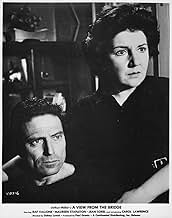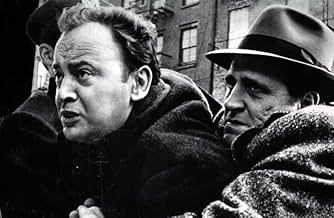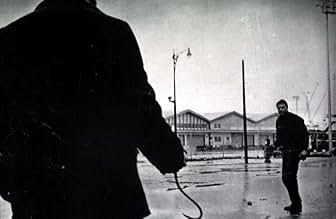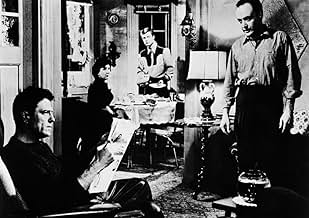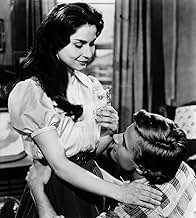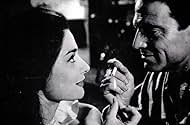Eddie harbors secret love for his niece Catherine. When her cousins, illegal immigrants Marco and Rodolpho, arrive, Catherine falls for Rodolpho. Eddie, consumed by jealousy, reports the imm... Read allEddie harbors secret love for his niece Catherine. When her cousins, illegal immigrants Marco and Rodolpho, arrive, Catherine falls for Rodolpho. Eddie, consumed by jealousy, reports the immigrants, leading to tragic consequences.Eddie harbors secret love for his niece Catherine. When her cousins, illegal immigrants Marco and Rodolpho, arrive, Catherine falls for Rodolpho. Eddie, consumed by jealousy, reports the immigrants, leading to tragic consequences.
- Awards
- 1 win total
Michel Mourlet
- Extra
- (uncredited)
Featured reviews
This play by Arthur Miller was filmed by Sidney Lumet in France, but why? Lumet brings us the gritty and dark world of immigrant longshoreman Eddie Carbone (Raf Vallone) and his family ... wife Maureen Stapleton and her niece Carol Lawrence. Carbone is involved in illegally bringing two Italians (cousins of Stapleton) into the US and getting them jobs on the wharfs of New York City. But something goes very wrong when the younger man (Jean Sorel) starts to get involved with Lawrence and Carbone's jealousy and lust for the girl come to the surface.
All the main characters live in a small and squalid apartment, the perfect setting for the pent up lust and anger that fuels the actions of the characters. The more Carbone lusts for the girl, the more he despises the young Italian and his "foreign" ways, hinting at his homosexuality because he is blond and likes to sing.
Vallone is superb as the volatile and treacherous Eddie Carbone who finally is consumed by his raging passions. Stapleton is solid as the aggrieved wife who remains loyal even as she slowly begins to understand her husband's actions. Jean Sorel is terrific as the young Italian as is Raymond Pellegrin as his older brother.
The real surprise here is Carol Lawrence as young Catherine. Generally considered a musical performer (WEST SIDE STORY), she turns in an amazing performance the innocent girl who finally comes of age.
Co-stars include Morris Carnovsky as the compassionate lawyer, Vincent Gardenia as the grocer, Harvey Lembeck, Frank Campanella, and Mickey Knox as co-workers.
All the main characters live in a small and squalid apartment, the perfect setting for the pent up lust and anger that fuels the actions of the characters. The more Carbone lusts for the girl, the more he despises the young Italian and his "foreign" ways, hinting at his homosexuality because he is blond and likes to sing.
Vallone is superb as the volatile and treacherous Eddie Carbone who finally is consumed by his raging passions. Stapleton is solid as the aggrieved wife who remains loyal even as she slowly begins to understand her husband's actions. Jean Sorel is terrific as the young Italian as is Raymond Pellegrin as his older brother.
The real surprise here is Carol Lawrence as young Catherine. Generally considered a musical performer (WEST SIDE STORY), she turns in an amazing performance the innocent girl who finally comes of age.
Co-stars include Morris Carnovsky as the compassionate lawyer, Vincent Gardenia as the grocer, Harvey Lembeck, Frank Campanella, and Mickey Knox as co-workers.
A View From The Bridge transcends its stage-play roots to give an earthy feel for its neighborhood and its neighbors. This is high praise considering the play is one of Arthur Miller's very best to begin with. The chemistry is devastatingly hot between Raf Vallone and his illicit love for niece Carol Lawrence who, at first admires him, but later turns on him with disgust. Maureen Stapleton is magnificent as Vallone's desperate wife. Vincent Gardenia is disarmingly young in an early role. The cinematography seems to peel the layers of this blue-collar area like an onion, and the score is simply perfect. A View from the Bridge is a neglected classic that needs to be restored to prominence.
I just saw this excellent movie in a crappy DVD transfer, actually a DVD-R. It is also available on YouTube. As far as I can see it's the only version available in English at this time and there is no one in French although the movie was apparently shot also in French for the European market.
The setting of the Arthur Miller play in the docks may be surprising at first but it works, allowing parts of the story to take place in outdoors. One can recognize the director's legendary ability with the comedians. They look and sound so naturel that you could believe they have never played another role in their career. The dramatic tension reaches a peek in the third part of the movie. I was riveted to my TV set despite, again, the lousy quality of the support.
The setting of the Arthur Miller play in the docks may be surprising at first but it works, allowing parts of the story to take place in outdoors. One can recognize the director's legendary ability with the comedians. They look and sound so naturel that you could believe they have never played another role in their career. The dramatic tension reaches a peek in the third part of the movie. I was riveted to my TV set despite, again, the lousy quality of the support.
This comes from a particularly satisfying period in the career of Sidney Lumet. Based upon one of the masterpieces of American theatre, the exteriors are filmed in his beloved New York whilst the interiors are shot in France. It is a Franco-Italian production and having the three leading male protagonists speaking in broken English contributes immeasurably to the films authenticity.
It is pretty faithful to the original apart from the ending and in changing the role of the lawyer Alfieri from that of Greek chorus to the voice of reason. Longshoreman Eddie Carbone has no time for reason as he is ruled by the heart and not the head. Like so many tragic characters he is basically a decent man whose fatal flaw, in this case, his improper love for his teenage niece, destroys him.
Carbone here is played by ex-footballer Raf Vallone who belongs to that rare breed: a hunk who can act. He has given some strong portrayals in his time, notably in Dassin's 'Phaedra', but this powerhouse performance has it all and he is fully deserving of his David di Donatello award.
One of playwright Arthur Miller's favoured devices is to have what appears to be a happy domestic scene shattered by a catalyst which in this piece is the arrival of two of Mrs. Carbone's cousins from Italy. They are illegal immigrants but Eddie agrees to put them up and get them jobs on the docks. Tensions mount however as Carbone's beloved niece falls for one of them.......
The immigrants Marco and Rodolpho are played superbly by Raymond Pellegrin and Jean Sorel. This is, to my knowledge, Pellegrin's strongest role and Sorel of course was always underrated because of his impossibly good looks. Another performance to treasure is that of Carol Lawrence as the niece. An all round actress/singer/dancer she was denied the chance of reprising on screen her award winning stage role as Maria in 'West Side Story' and although on paper a wee bit too old for the part of Catherine, gives a magnificent performance. Sadly, this is her only film. As Mrs. Carbone we have the accomplished Maureen Stapleton, who combines strength and vulnerability. Mention must also be made of Morris Charnovsky as Alfieri. An excellent actor whose film career was scuppered after being 'named' by Elia Kazan to the HUAC.
Historically there is a strong connection between Kazan's 'On the Waterfront' and Miller's play, for those who care to look it up. Whereas in Kazan's film to inform is an act of heroism, here it is merely an act of betrayal.
Lumet's legendary skill with actors, Norman Rosten's screenplay, Michel Kelber's gritty cinematography and the beautifully understated score of Maurice Le Roux have given us a raw, stark, passionate, searing and visceral film which also seems to have served the playwright well. Let us hope Mr. Miller approved.
It is pretty faithful to the original apart from the ending and in changing the role of the lawyer Alfieri from that of Greek chorus to the voice of reason. Longshoreman Eddie Carbone has no time for reason as he is ruled by the heart and not the head. Like so many tragic characters he is basically a decent man whose fatal flaw, in this case, his improper love for his teenage niece, destroys him.
Carbone here is played by ex-footballer Raf Vallone who belongs to that rare breed: a hunk who can act. He has given some strong portrayals in his time, notably in Dassin's 'Phaedra', but this powerhouse performance has it all and he is fully deserving of his David di Donatello award.
One of playwright Arthur Miller's favoured devices is to have what appears to be a happy domestic scene shattered by a catalyst which in this piece is the arrival of two of Mrs. Carbone's cousins from Italy. They are illegal immigrants but Eddie agrees to put them up and get them jobs on the docks. Tensions mount however as Carbone's beloved niece falls for one of them.......
The immigrants Marco and Rodolpho are played superbly by Raymond Pellegrin and Jean Sorel. This is, to my knowledge, Pellegrin's strongest role and Sorel of course was always underrated because of his impossibly good looks. Another performance to treasure is that of Carol Lawrence as the niece. An all round actress/singer/dancer she was denied the chance of reprising on screen her award winning stage role as Maria in 'West Side Story' and although on paper a wee bit too old for the part of Catherine, gives a magnificent performance. Sadly, this is her only film. As Mrs. Carbone we have the accomplished Maureen Stapleton, who combines strength and vulnerability. Mention must also be made of Morris Charnovsky as Alfieri. An excellent actor whose film career was scuppered after being 'named' by Elia Kazan to the HUAC.
Historically there is a strong connection between Kazan's 'On the Waterfront' and Miller's play, for those who care to look it up. Whereas in Kazan's film to inform is an act of heroism, here it is merely an act of betrayal.
Lumet's legendary skill with actors, Norman Rosten's screenplay, Michel Kelber's gritty cinematography and the beautifully understated score of Maurice Le Roux have given us a raw, stark, passionate, searing and visceral film which also seems to have served the playwright well. Let us hope Mr. Miller approved.
Based on a play by Arthur Miller, the film is very typical of its era (where many such classic plays were adapted for the screen) but also characteristic of director Lumet - who was constantly striving to push barriers (among the themes touched upon here are incest and homosexuality!) and always put his greatest emphasis on the acting. In fact, the cast here is an eclectic but surprisingly effective mix of American, French and Italian actors (though set in Brooklyn, the film was actually shot in France!) - with Raf Vallone especially impressive in his difficult role. The film's dock-side setting (gloomily photographed by Michel Kelber) recalls, to a certain extent, ON THE WATERFRONT (1954) - though this is more of a domestic melodrama; still, the final confrontation between Vallone and Raymond Pellegrin (with its tragic aftermath) reaches a fine pitch of tension.
Did you know
- TriviaThe screen play is based on the stage play "A View From the Bridge" by Arthur Miller which opened at the Coronet Theater on September 29, 1955 and ran for 148 performances.
- Alternate versionsTwo separate versions were filmed: one in English, the other in French.
- ConnectionsFeatured in The Celluloid Closet (1995)
- How long is A View from the Bridge?Powered by Alexa
Details
- Runtime
- 1h 50m(110 min)
- Color
- Aspect ratio
- 1.37 : 1
Contribute to this page
Suggest an edit or add missing content


